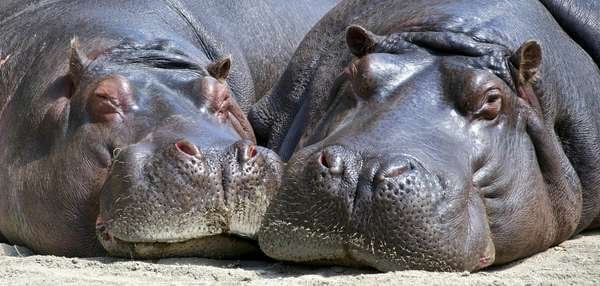Prepare to be Shocked: Australia to Welcome Hippos for the First Time in 40 Years!
By
Danielle F.
- Replies 3
In a move that's set to make waves in the Australian zoo community, the country is poised to welcome the arrival of hippopotamuses for the first time in four decades. This exciting development comes after a lengthy 40-year ban on importing these majestic creatures was finally lifted, paving the way for a significant boost to local breeding programs and conservation efforts.
The ban, initially put in place due to biosecurity disease risks, had seen the numbers of hippos in Australian zoos dwindle over the years. With only five pygmy hippos and nine female common hippos remaining, the genetic diversity of these populations was at risk. However, the change in policy has brought a surge of hope to zoos across the nation, including Victoria's Werribee Open Range Zoo, which is eagerly anticipating the arrival of a male common hippo by 2025.

Yvette Pauligk, the life science manager at Werribee Zoo, expressed her excitement about the news, highlighting the importance of introducing new genetics and individuals to strengthen the regional hippo population. The zoo, which is home to three female common hippos named Lotus, Primrose, and Tulip, has not seen a baby hippo born since 2013, following the death of their bull, Harold. The prospect of new arrivals has the potential to reinvigorate the zoo's breeding program and contribute to the global conservation of these vulnerable African herbivores.
The Department of Agriculture, Fisheries and Forestry Biosecurity Animal Division has played a crucial role in this development. Team member Brant Smith emphasized the importance of zoos as providers of 'genetic insurance' for endangered species like hippos. He also pointed out the research opportunities that captive populations offer, allowing scientists to study hippo behavior, mating rituals, and feeding habits in a controlled environment.
The biosecurity review was thorough, ensuring that the importation of hippos would not compromise Australia's ecological, zoological, and agricultural environments. Measures have been put in place to prevent the introduction of exotic diseases that could affect not only hippos but other animals and threatened species as well.
The new hippos will only be allowed entry from approved international zoos, and once they arrive, the Werribee Zoo is committed to providing them with a habitat that allows for natural behaviors. The zoo's open range setting and emphasis on animal welfare mean that the hippos will have ample space to roam, graze, and enjoy water activities, mirroring their wild counterparts as closely as possible.
Pygmy hippos, considered endangered and in need of more public awareness, can currently be found at Taronga, Darling Downs, Melbourne, and Adelaide Zoos. The importation of additional hippos is expected to bolster the efforts to keep their breeding going and to educate visitors about the challenges these animals face in the wild, where habitat conflict with humans is a significant issue.
Ms Pauligk also hopes to change public perceptions of hippos, often seen as aggressive when threatened. She describes them as 'underrated' gentle giants, akin to 'giant labradors,' who are interactive, enjoy human touch, and exhibit joyful behaviors when engaging with zookeepers.
The arrival of hippos to Australian shores is not just a win for local zoos but a triumph for conservationists and animal lovers alike. It's an opportunity to reconnect with a species that has been absent from the Australian landscape for far too long and to play a part in the global effort to secure their future.
So, dear members of the Seniors Discount Club, get ready to embrace these aquatic giants as they make their grand return. It's a momentous occasion that promises to bring joy and wonder to visitors of all ages, and a reminder of the vital role that zoos play in the preservation of our planet's diverse wildlife.

We'd love to hear your thoughts on this exciting news! Have you ever had a memorable encounter with a hippo, either in the wild or at a zoo? Share your stories in the comments below, and let's celebrate the return of the hippos together!
The ban, initially put in place due to biosecurity disease risks, had seen the numbers of hippos in Australian zoos dwindle over the years. With only five pygmy hippos and nine female common hippos remaining, the genetic diversity of these populations was at risk. However, the change in policy has brought a surge of hope to zoos across the nation, including Victoria's Werribee Open Range Zoo, which is eagerly anticipating the arrival of a male common hippo by 2025.

Importing hippopotamus inside Australia has been banned due to biosecurity reasons. Image Credit: Pexels/Pixabay
Yvette Pauligk, the life science manager at Werribee Zoo, expressed her excitement about the news, highlighting the importance of introducing new genetics and individuals to strengthen the regional hippo population. The zoo, which is home to three female common hippos named Lotus, Primrose, and Tulip, has not seen a baby hippo born since 2013, following the death of their bull, Harold. The prospect of new arrivals has the potential to reinvigorate the zoo's breeding program and contribute to the global conservation of these vulnerable African herbivores.
The Department of Agriculture, Fisheries and Forestry Biosecurity Animal Division has played a crucial role in this development. Team member Brant Smith emphasized the importance of zoos as providers of 'genetic insurance' for endangered species like hippos. He also pointed out the research opportunities that captive populations offer, allowing scientists to study hippo behavior, mating rituals, and feeding habits in a controlled environment.
The biosecurity review was thorough, ensuring that the importation of hippos would not compromise Australia's ecological, zoological, and agricultural environments. Measures have been put in place to prevent the introduction of exotic diseases that could affect not only hippos but other animals and threatened species as well.
The new hippos will only be allowed entry from approved international zoos, and once they arrive, the Werribee Zoo is committed to providing them with a habitat that allows for natural behaviors. The zoo's open range setting and emphasis on animal welfare mean that the hippos will have ample space to roam, graze, and enjoy water activities, mirroring their wild counterparts as closely as possible.
Pygmy hippos, considered endangered and in need of more public awareness, can currently be found at Taronga, Darling Downs, Melbourne, and Adelaide Zoos. The importation of additional hippos is expected to bolster the efforts to keep their breeding going and to educate visitors about the challenges these animals face in the wild, where habitat conflict with humans is a significant issue.
Ms Pauligk also hopes to change public perceptions of hippos, often seen as aggressive when threatened. She describes them as 'underrated' gentle giants, akin to 'giant labradors,' who are interactive, enjoy human touch, and exhibit joyful behaviors when engaging with zookeepers.
The arrival of hippos to Australian shores is not just a win for local zoos but a triumph for conservationists and animal lovers alike. It's an opportunity to reconnect with a species that has been absent from the Australian landscape for far too long and to play a part in the global effort to secure their future.
So, dear members of the Seniors Discount Club, get ready to embrace these aquatic giants as they make their grand return. It's a momentous occasion that promises to bring joy and wonder to visitors of all ages, and a reminder of the vital role that zoos play in the preservation of our planet's diverse wildlife.
Key Takeaways
- Australia is set to resume the importation of both common and pygmy hippos to zoos after a 40-year cessation due to biosecurity concerns.
- Werribee Open Range Zoo in Victoria is planning to import a male common hippo by 2025 to boost breeding programmes and introduce new genetics.
- The Department of Agriculture, Fisheries and Forestry has conducted a biosecurity review to ensure that the importation of hippos does not introduce exotic diseases and can now proceed with specific safety measures in place.
- Efforts to bring hippos into the country are part of conservation strategies, with zoos providing genetic insurance for these vulnerable species and offering new research and educational opportunities.







